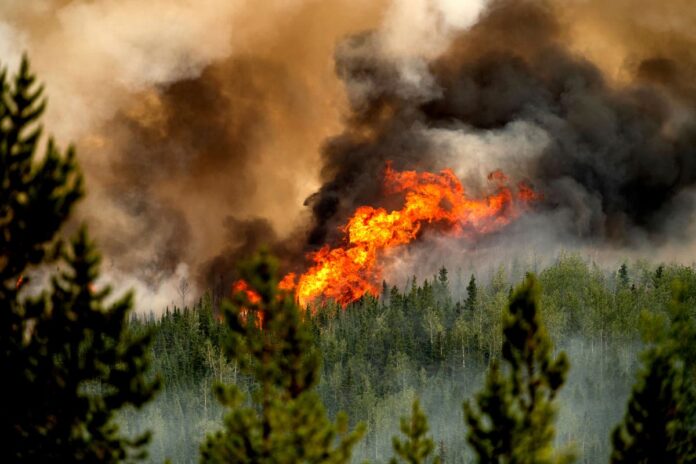The worst wildfire season in Canada ‘s history shows no sign of abating as the number of blazes increased yet again this week. There were 883 active fires across provinces and territories on Thursday with two-thirds burning out of control, according to the Canadian Interagency Forest Fire Centre (CIFFC). The fires have impacted the country for months leaving miles of blackened forests and forcing thousands of residents from their homes. While the number of fires decreased slightly on Wednesday, the number has still nearly doubled from a month ago. In mid-June, Canada was tackling around 450 wildfires. Officials have warned that this could be the country’s worst wildfire season on record and that smoke would be a problem ‘all summer’. The climate crisis , caused by emissions from fossil fuels, is driving larger, more frequent and erratic wildfires around the world. Many countries are becoming hotter and drier, priming more of the landscape to burn. According to the Canada Drought Monitor, ten provinces have experienced abnormal dryness this year. There have been 4,298 fires so far this year in Canada destroying more than 42,000 square miles – an area roughly three times the size of the Netherlands. Flames from the Donnie Creek wildfire burn along a ridge top north of Fort St. John, British Columbia, earlier this month The fires are having impacts far beyond the country’s borders with smoke causing high levels of air pollution across the US and as far away as Europe. On 7 June, New York City shot above 400 on the Air Quality Index (which runs from 0-500) – a ‘hazardous’ level of pollution that bathed the city in an eerie orange haze. Two firefighters have died fighting the disasters. One male firefighter from Fort Liard in Canada’s Northwest Territories died from an injury sustained while tackling a blaze near his community, authorities said this week. A map of the fires burning across Canada on 20th July Devyn Gale, a 19-year-old female firefighter, was also killed by a falling tree near Revelstoke, British Columbia while battling blazes. Canada’s Indigenous communities have been particularly badly affected and make up a much larger share of evacuees than their share of the population. That includes members of the East Prairie Metis Settlement in northern Alberta , where 14 homes were destroyed in an early May fire and almost 300 people were evacuated. With additional reporting from
Canada’s wildfires blacken thousands of square miles and just keep growing
Sourceindependent.co.uk
RELATED ARTICLES


